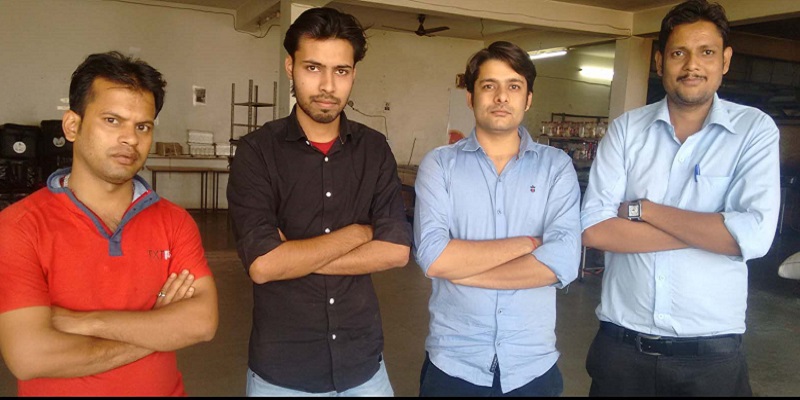Category: Funding Rounds
Bengaluru-based foodtech startup, Mr. Hot Foods raises seed funding via the IvyCamp platform
Food delivery services startup Mr. Hot Foods Pvt. Ltd said on Tuesday it has raised an undisclosed amount of seed funding from angel investor Pawan Raj Kumar through the IvyCamp platform.
“The addition of Pawan as a mentor to our team has helped us to understand the dynamics of Food & Beverage industry on a larger scale. His ideas and regular inputs help us in strategic decision making,” co-founder of Mr. Hot Food, Pankaj Sharma said.
Founded in 2014, by IIT Kharagpur alumni Pankaj Sharma . Mr. Hot Foods aggregates local bhojanalayas (local eating houses), thali houses, and tiffin centers to deliver homely food to users in a restaurant style of ordering with standardized packaging.
The vendors get training from professional chefs and access to analytics and technology to handle operations efficiently. Operating in Indore, Madhya Pradesh, and Kota, Rajasthan, the startup delivers more than 1500 meals daily to students and professionals who work away from home.
The company also has a weekly menu planner for a regular subscription, where a customer can plan his or her diet among 15 to 16 items per day per shift according to taste, diet, and budget. Also, Mr. Hot Foods either charges 4% of the total order cost or a fixed monthly fee from vendors.
“Our revenue model is very simple, where a customer gives us advance money to recharge online food wallet and can consume it either by filling menu planner or by ordering instant orders as and when they need. We are working on tie-ups with corporate offices and institutions by providing them food in bulk at a discounted price,” says Pankaj.
Bootstrapped, the team has been looking for external funding to expand across different parts of the country which has been met by the fundraiser facilitated by IvyCamp – an innovation and entrepreneurship platform by IvyCap Ventures, which connects entrepreneurs with mentors, investors and incubation centers through the global alumni networks of institutes such as IITs, IIMs, ISB and BITS Pilani.
Prior to this, the online food ordering business in India is estimated to be worth around INR 6,000 crore (about US$ 883 million), growing at about 30% month to month, according to a report by India Brand Equity Foundation, released earlier this year.
Commenting on the announcement, Anju Gupta, cofounder and president at IvyCamp said that, “Amidst the food tech funding pullback, we were able to get funding for Mr. Hot Foods Due to their innovation in business models and are sure they will be able to raise more via the IvyCamp platform.”
Looking at other Indian food tech startups, MonkeyBox Food Tech Pvt. Ltd, which delivers healthy food for children has also raised an undisclosed amount in seed investment from early-stage investor Blume Ventures. While in September, food-tech startup Idea Chakki Pvt. Ltd also secured an undisclosed amount of seed funding from Ratan Tata, interim chairman of Tata Sons.
By Vivian Foo, Unicorn Media
Singapore Jungle Ventures Closes Second Funding Round With US$100 Million
Singapore-based venture capital fund Jungle Ventures has made the final close of its second funding round, after meeting its target of US$1OO million. The VC funding plans have started since September 2015. These new funds represent a big step comparing to Jungle Venture’s first funding round in 2010, whereby the firm first debuted with only US$10 million when launched in 2011.
The VC, then, was headed by Amit Anand and Anurag Srivastavaa, with its first pan-Asian super Angel fund participated by individual investors which included founder of Match.com, Interwoven and Encentuate, Peng T Ong; Chief Executive of Space Matrix, Lim Der Shing; Former Head of engineering at Skype Toivo, Angus and co-founder of Sony Entertainment Television Jayesh Parekh among others.
And throughout this six years, the venture capital firm has expanded its investment portfolio with more than 30 investments using the funds from its initial round. These investments include a long list of companies across different regions which include firms such as Singapore-based TradeGecko, Travelmob, Fastacash and Crayondata; India-based Zipdial, Livespace, and Pokkt; Malaysia-based iMoney and CatchThatBus as well as Thailand-based Pomelo Fashion and Australia’s Edrolo.
According to a statement, the selection of these investments is based on two categories. That is they either have the potential of becoming a regional category leader, for example, Zipdial that was acquired by Twitter and iMoney, which has the potential of dominating the entire South East Asian market. Or they can have the potential to be a global category leader such as TradeGecko, an inventory management software or interior design company, Livspace.
With the new funds, this will also bring change to the operations of Jungle Ventures as the VC is now likely to cut larger cheques and will likely shift its initial focus on seed-stage deals to Series A and Series B investments primarily in Southeast Asia, India, and Australia. However, the company will also still be very much involved in early stage startup work, being handled by SeedPlus, a new fund that it has to establish in May this year.
According to a statement, Jungle Ventures second fund attracted existing and new investors including institutions such as Temasek Holdings, International Finance Corporation, National Research Foundation of Singapore, Hubert Burda Media as well as leading family office investors such as the Kewalram Chanrai Group and Khoon Hong Kuok.
“This is a significant milestone for Southeast Asia’s fast-growing startup ecosystem and we are grateful fo the faith existing investors and new partners have shown in us. With an exceptional team of 15 investing and operational professionals we intend to continue to invest and help build the best technology companies from this region,” said Amit Anand, the Founder of Jungle Ventures.
For more information, please visit http://www.jungle-ventures.com/
By Vivian Foo, Unicorn Media
ShopsUp, An Online-To-Offline (O2O) Shopping App Secures US$1 Million In Seed Funding
Following China’s Meituan-DianPing valuation at US$18 billion and KFit’s double acquisition of Groupon’s Malaysia and Indonesia operations. We now move to the O2O sector in India, as Bengaluru-based HyperKonnect Technologies Pvt Ltd has raised a seed funding of Rs 6.6 lakh crore (about US$1 million) for their O2O shopping app platform – ShopsUp.
Two individual investors have participated in this round of seed funding, which are the former president of Huawei Technologies Co. Ltd and present Southeast Asia CEO of Taojinjia, Yang Shu and VR Logistics Ltd’s managing director and promoter, Anand Sankeshwar.
Founded by serial entrepreneur Suhas Gopinath, the app allows shoppers to search online and shop offline from nearby areas. The application also showcases various deals available at neighborhood stores as well as push notifications that are customized according to the users’ search preferences and history.
Despite a boom in e-commerce as seen in Alibaba’s Singles Day Sales or the recent Black Friday sales, India’s retail market which is expected to hit US$1.3 trillion by 2020 has only registered a compound growth rate of 16.7 percent since 2015. Thus, this clearly shows the significance of offline shopping which still retains in the habits of the consumers in the world’s second-biggest smartphone market.
With this, ShopsUp aims to bridge the gap between online and offline shopping by becoming a virtual shopping companion to millennials. With a promise of getting “high on shopping”, ShopsUp targets millennials who still prefer the traditional way of shopping from brick and mortar stores, targeting them with exclusive offers and discounts from their favorite brands and stores.
An additional feature available in the ShopsUp app is that the startup awards loyalty points called ‘shots’ to app users when they shop at partnering stores. This offers instant gratification via rewards that they collect through purchases and even walk-ins in store, collecting loyalty points which can later be redeemed for offers at selected brands outlet.
Some of the rewards that can be redeemed include free movie tickets, cabs rides, spas, or gift vouchers. ShopsUp has also partnered with Uber to provide convenience for buyers with their shopping runs. Besides, other ShopUps’ partnership include Adidas, Pepe Jeans, and Van Heusen, among some.
“Indian millennials want to be rewarded for their window shopping as well as actual shopping behavior, and marketers want to capture these moments as and when they happen,” said Suhas Gopinath, the co-founder and CEO at ShopsUp, “Use of analytics also allows us to partner with top brands and local boutiques and provide them with customized solutions,” he added.
The ShopsUp app is currently available for the Android platform while the iOS version is slated to come soon. Ultimately, the plan for ShopsUp is to use the smartphone to help brand and retail partners with data on a consume’s decision-making habits and choices by telling them where to shop as well as incentivizing the shopper to buy more offline, guiding them to find the right store and desired product while helping shops increase their walk-in rates.
In closing, other startups are also growing in the O2O sector in India. Such as Fashalot, which in April this year, has secured a seed funding round led by YourNest Angel Fund and angel investor Rajul Garg. In the same month, hyperlocal fashion commerce portal Yufta has also raised an undisclosed amount of capital in their pre-Series A. With that, one of the challenges that ShopsUp will face is the competition in this crowded sector, especially India’s largest digital wallet player Paytm, who is also tightening its hold in the O2O commerce space with its acquisition of Near.in last December.
For more information, please visit http://shopsup.com/
By Vivian Foo, Unicorn Media
Japan’s Seven Dreamers Laundry-Folding Robot ‘Laundroid’ Secures US$60 Million In Series B Funding Round
After the washing machine and clothes dryer, the year of 2016 finally introduces the world’s first laundry-folding appliance known as Laundroid. Firstly revealed at the Consumer Electronics Show in Las Vegas and Createc Japan in Tokyo this year, the appliance which is roughly the size of a standard refrigerator, has created quite a stir, though not all remarks were positive.
The machine takes up to 4 minutes and 30 seconds to fold a T-shirt, which was for some, not impressive enough. Despite that, Seven Dreamers has still managed to secure a funding of 6 billion yen (around US$60 million) from SBI Investment, in addition to Panasonic and Daiwa House. However, the shareholding ratios and payment date remain undisclosed. Besides, this is only a trial manufacture and the developers are optimistic that the machine’s overall performance can be enhanced through continued modifications and refinements of the robotics functionality.
To date, Laundroid can distinguish four categories of laundry (shirt, pants, skirts and towels). The process is simple and one just has to pull out the drawer at the bottom to throw the crumpled clothes in. Then, the image recognition algorithms will identify the type of clothing it is handling as each item is moved up to the shelves and folded appropriately. The whole operation combines clothing analysis, artificial intelligence (AI), and robotics blend together, as well as a period of 10 years to produce this fully automatic clothes folding machine.
Laundroid is also able to constantly learn and improve its performance as the appliance is connected to the data from the loT network which will be transferred to Seven Dreamers original server which will research on the collective data to provide better customer service. With Laundroid, Seven Dreamers said that an average person can save the 9000 hours which are used to fold their laundry. That is 367 days which can be used for other productive activities, such as binge-watching Netflix with family or friends or cultivate a hobby.
According to the Founder and CEO of Seven Dreamers, Shin Sakane, the reason behind the creation of Laundroid was based on a comment by his wife. As well as the idea to create something never seen before, to be producers of “Things not already in this world”. Apart from Laundroid, the company has two other products which are Nastent, a nasal strip for less snoring sleep and a carbon golf shaft.
However, as much as eliminating one of the tedious chores of mankind can be a great idea, the amount of space needed for Laundroid along with a likely plus-size price tag means that the robot probably won’t be a common fixture in most homes in the years to come. On the other hand, Laundroid might have more of a future for businesses that need to fold a ton of stuff, such as a clothing store, hotel or nursing care facilities.
Seven Dreamers plans to begin Laundroid sales by reservation for their first machine “Laundroid 1” in March 2017.
For more information, please visit https://sevendreamers.com/en/ or take a look at the demonstation of Laundroid via https://youtu.be/FzZSpiqvb1Q
By Vivian Foo, Unicorn Media
Malaysian Food Delivery Startup ‘Dah Makan’ Is In Talks With Global VCs For Their Next Funding Round
From Nasi Lemak and Roti Canai to the iconic Penang Laksa, Malaysia has a reputation of being a food paradise. It is little wonder that its hottest sector, for both startups and venture capitals, turns out to be the food delivery service.
Currently, online food orders have represented 15 percent of a massive US$70 billion market, and the figure is continuously increasing as consumers are now moving online to do everything, from online bank transactions, shopping and even ordering food for their next meal.
Many food delivery services have rise to fill this demand. Driven by technology, these food delivery services which include The Lean Canteen, The Lunch Club Asia, Chopstick Diner, Naked Lunch Box and The Rebellious Chickpea among some, work to deliver lunch to the busy Malaysian. But one startup stands out among the rest through delivering healthy, foreign options.
“Dah Makan” which in Malay, means “Have you eaten?”, is a Malaysian startup that plans to make daily eating a simple luxury as the company creates healthy gourmet for lunch and dinner which are MSG-free and crafted with the finest ingredients. These cuisines are then packed in a lunch box and delivered to the doorstep within 30 to 45 minutes. With this, healthy eating has become even more convenient and affordable.
But most importantly, the startup described themselves as a “full-stack” food delivery service, which means that they are in control of the whole value chain from menu creation, ingredients sourcing, production delivery as well as customer care. This translates into maintained quality as their orders continue to grow. Besides, Dah Makan also does not compromise on the taste buds as the kitchen is helmed by Executive Chef Shamsul Hashim, who previously worked in Sheraton and Hilton.
Co-founded by Jessica Li, Johnathan Weins and Christian Edelmann, the previous two being ex-FoodPanda team members. It was in December 2014, that the team bootstrapped their startup and tested their idea by preparing the meals out of their own apartment for friends. The venture was self-funded with only US$40,000.
In March 2015, The healthy food delivery startup has its first angel seed round, raising US$80,000 (RM340,184) from two angel investors over. Since then, the startup has used the funds to improve and expand their services where it has grown to cover around 80 percent of the Klang valley region and develop the Dah Makan’s mobile app. The funding also allowed them to relocate into a building with a bigger central kitchen, and other processes like hiring, marketing and developing their logistics.
“We are right now finalizing a larger round with several global VCs with extensive experience in e-commerce and consumer brands. It’s very important to have the right investors on board as they can have a significant influence on the future of a company,” founder and CEO of Dah Makan, Jonathan Weins told DealStreetAsia in an interview.
Although currently, the team only delivers to all major business areas in KL and selected residential areas. The startup looks forward to scaling up its target from its current 1000 orders per day to reach 10,000 in a year or two. Beyond that, Dah Makan plans to expand to Singapore and Jakarta early next year – as well as other Malaysian cities besides Kuala Lumpur, having receiving queries from people in Penang and Johor Bahru, asking when Dah Makan will come to them.
Specifics about the funding were not disclosed but Johnathan Weins, the CEO of Dah Makan, said that an announcement on the funding may come in a few months.
For more information, please visit https://order.dahmakan.com/
By Vivian Foo, Unicorn Media





